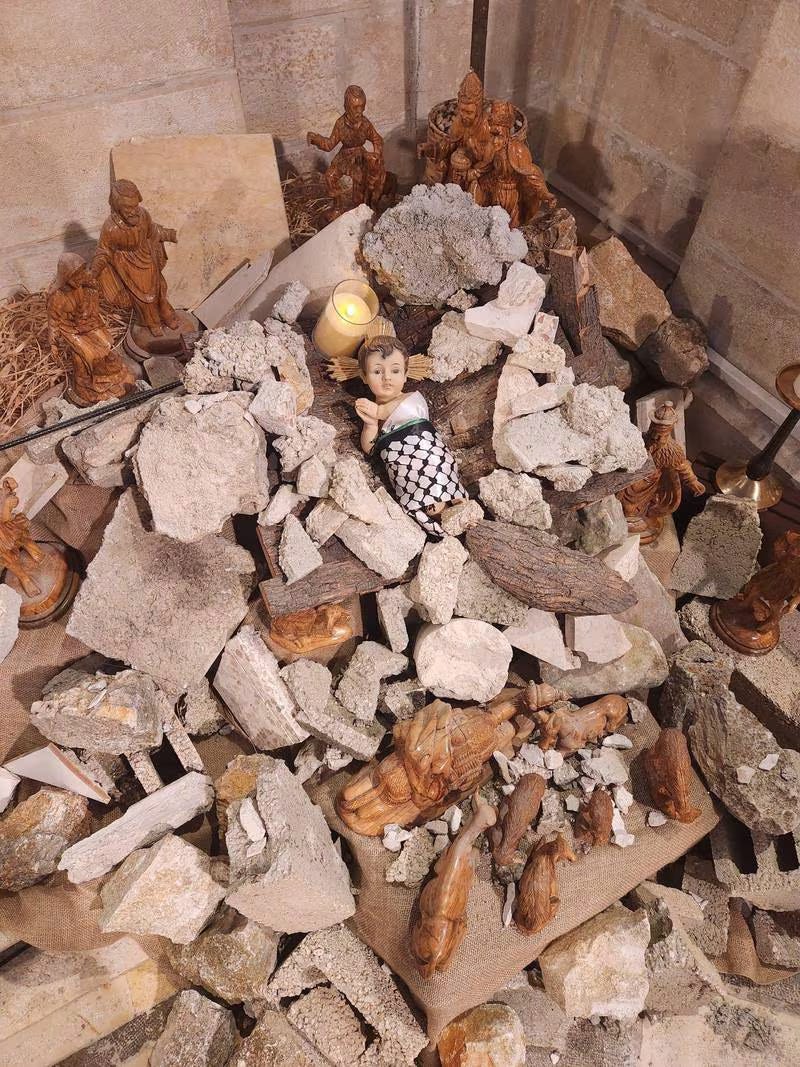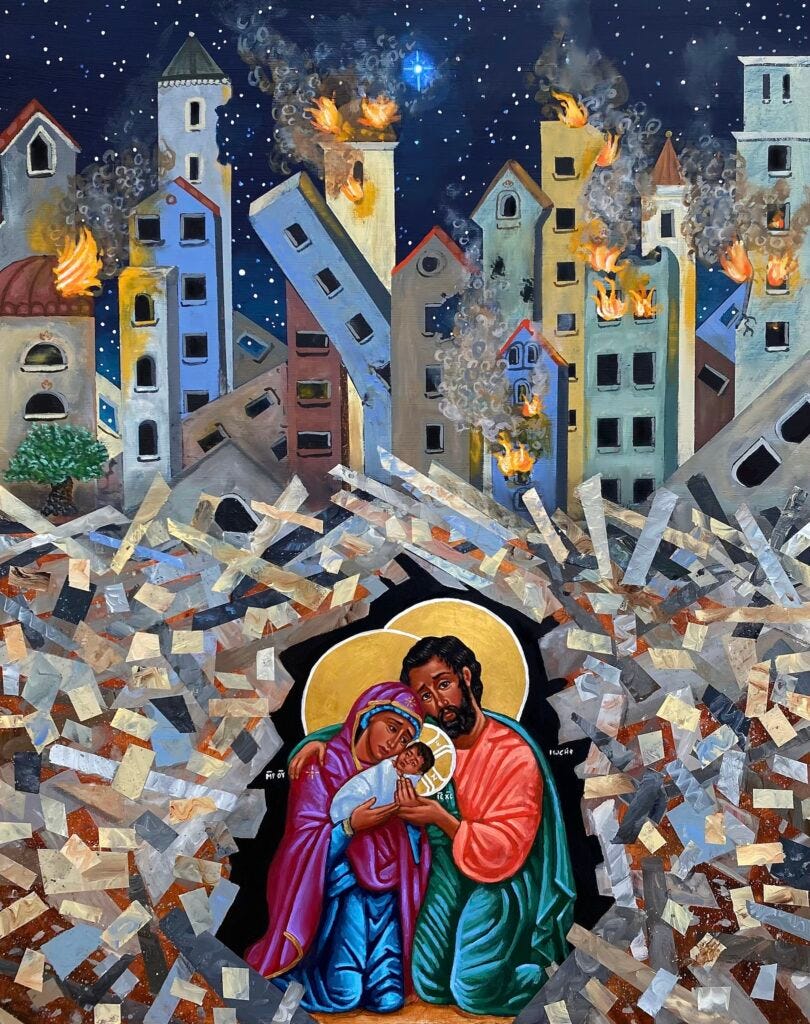What is left out of the narrative of Jesus’ birth t is just as fascinating as what is included. The birth of Jesus is given a paltry 7 lines. While Luke treats the journey to Bethlehem and the actual birth in sterile terms, most of us, even those of us who have never given birth, have some inkling about the pain Mary must have experienced. She was almost to term, traveling from one part of the country to another, to fulfill a census for an oppressive ruler.
Moreover, she is forced to give birth in a manger because there was no other space for her. Imagine the physical discomfort: the contractions, the swollen feet, the aching back. Even if she rode a donkey as commonly portrayed in paintings and movies, I can’t imagine that the journey was very comfortable. I mean, I have never been but after a few minutes of sitting somewhere with a back support, I am already exhausted. And I am not having to deal with the physical symptoms of growing a whole new life.
Not to mention that ancient travel could be dangerous. The gospel does not say if they traveled with a group or alone, but both contain their own dangers. Traveling alone left them vulnerable to thieves and bandits. Traveling with a group might mean traveling with a bunch of people they do not know. And if they were in a group, once they reached their destination, it appears as if Mary and Joseph were on their own.
And of course, the gospel is silent on the physical labor required to give birth. In the US, giving birth is still dangerous, especially for Black and brown people. The US is theoretically at least, one of the most medically advanced nations in the world, and yet childbirth is still deadly. Can you imagine giving birth in the first century with no medical intervention available if things went wrong? And even if things went perfectly right, pregnancy is still a painful and exhausting experience. And to have to give birth after a long journey to fulfill the dictates of an oppressive empire?
Not surprised the gospel does not linger on the birth of Jesus. But I wish it did. The point of the gospel is the telling of the God who became human. And God becomes human in the most vulnerable way: God comes into the world covered in blood, sweat, and tears. God comes in the form of a helpless baby, to a Jewish Palestinian teenager, in the midst of one of the most violent and oppressive empires. God is born in a manager, not a place besetting the King of Kings.
Why does Jesus’ birth story matter? Because as Christians we celebrate the coming of Jesus into the world, not simply as a one-time event, but each Advent, we speak, remember, and honor this event. And we say that God via Jesus was born 2000 plus years ago and continues to be born. The incarnation is both a one-time event and an event that occurs repeatedly.
And this year it is vital we remember the incarnation, in all its messy reality. When Jesus was born, the reality was a manager, which probably did not smell great, in a land occupied and ruled by an oppressive force. In 2023 the reality is similar. As Rev. Munther Isaac pastor of Evangelical Lutheran Christmas Church in Bethlehem, Palestine said after placing a toy Jesus in the rubble: “If Christ were to be born today, he would be born under the rubble and Israeli shelling.”
Image: a toy baby Jesus laid in building rubble at Evangelical Lutheran Christmas Church in Bethlehem, Palestine
Photo from: https://www.thenationalnews.com/mena/palestine-israel/2023/12/07/baby-jesus-lies-amid-rubble-in-bethlehem-church-christmas-nativity-scene/
If Jesus were to be born today, he would be born amid the wholesale slaughter and displacement of the Palestinian people. He, Mary, and Joseph would be fleeing for their lives, as they attempted to avoid the bombs and the shooting that would snuff the lives of those around them. Jesus would be lying helpless, as his parents desperately try to protect him.
The point of the incarnation is the story of a God becoming one with the marginalized, the oppressed, and the silenced. And God is with those who are suffering unspeakable violence in Palestine. God is with and in the children who are being buried in rubble. God is with and in the mother and father who are screaming over the bodies of their dead children. God is with and in the children who are orphaned by the bombs falling on their heads. God is with and in those fleeing for their lives, as they struggle to receive food and medical care.
Now more than ever, Christians need to not only recount the story of the incarnation but use it as a reminder that we worship a God who became one of us, who came down to earth and became one of the oppressed and marginalized. Unlike Roman emperors, whose births are often described in terms of majesty and power: Jesus’ birth subverts the values of the dominant empire. Who would expect God to come in the form of a baby subject to the whims of the Roman Empire?
Similarly, God is found in the midst of the marginalized, experiencing systems of violence and domination. I’ve focused mainly on Gaza this month, for understandable reasons: but God is also being born in Sudan, Somalia, Ukraine, in poverty-stricken areas, in deserted rural towns, in overcrowded cities where the water is undrinkable
The point of the gospel is not to create a sentimental story that is recreated with barn animals and cute children. But it is to serve as a reminder that God came to join the marginalized and oppressed. The incarnation says you do not find God in the seats of the most powerful but in the helpless cries of scared children who are running from bombs, or whose stomachs are empty, or who live in daily poverty.
It is important that Christians, especially those of us with privilege, remember the pain, suffering, and fear of Jesus’ birth. And recognize that today, God is being born and can be found in the places that are ignored and forgotten by world powers. Now more than ever, we Christians need to name and worship, “God with us.”
Jesus' birth in the midst of empire is a testament to a God whose love knows no bounds: a God whose love is not based on status or wealth and who flips empire values upside down. In this final week of Advent, which also falls on Christmas Eve, let us embrace and embody God’s love. And we do so by advocating for a world where all are allowed to experience lives of safety and joy. Where we condemn collective punishment. God’s love is not passive but it demands and inspires action to protect the vulnerable.
Image: Kelly Latimore’s “Christ in the Rubble” depicts Mary, Joseph, and baby Jesus huddled under the ruins of a collapsed building.




